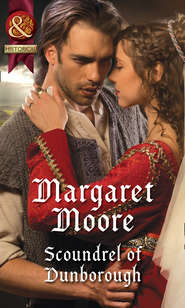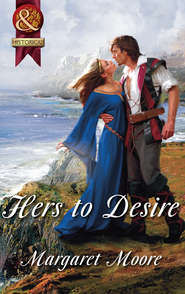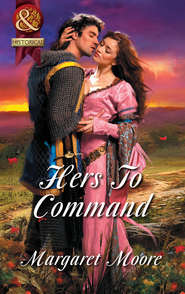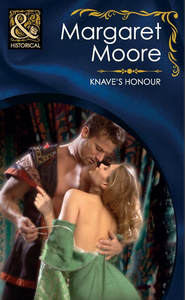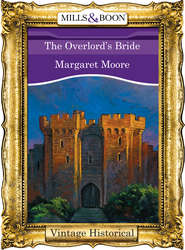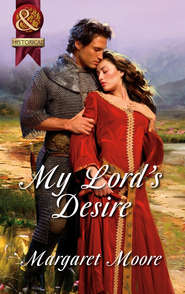По всем вопросам обращайтесь на: info@litportal.ru
(©) 2003-2025.
✖
The Notorious Knight
Настройки чтения
Размер шрифта
Высота строк
Поля
“Charles knows Sir Bayard de Boisbaston,” Dunstan said with a significant look.
“Not personally,” Charles added hastily. “I sell wine to many of the nobles who are friends of the king and his court.”
“Then you’ve seen him?” Gillian asked, trying not to betray any overt interest to de Fenelon.
She would also prefer that this wine merchant, whom she’d never met before, not be privy to any suspicions they might have about their supposedly noble guest.
“Many times, most recently when I came through your hall. He’s playing chess with a young man your steward says is his squire.”
So that knight really was who he claimed to be.
Gillian walked to her chair and slowly lowered herself onto it. That made it more likely that the letter she’d received was really from Adelaide, too, and therefore everything in it was true, as well.
If so, Adelaide had broken her vow and married, and Lord Armand de Boisbaston could be the master of Aver-ette. Therefore, and regardless of whatever Adelaide had promised, Gillian had no legal right to govern Averette. Lord Armand did, if he would lay claim to the estate.
God help her, he could take command of Averette and do whatever he liked. He could even send her away.
Dunstan cleared his throat and she realized the wine merchant was still there, watching her. She wanted to tell him to go, and Dunstan, too. She wanted to weep, and rant, and wail, but she managed to control that impulse.
Dunstan took a step closer and clasped his long fingers together, shaking his hands to emphasize his point as he always did when he had something important to say. “Unfortunately, my lady, there’s more. Charles tells me Sir Bayard is notorious for his seductions, and is a coward, as well. He’s reputed to have seduced over fifty women at court, and he surrendered the castle he was charged to hold in Normandy after a siege of less than a week. They also say he seduced his captor’s young wife.”
Gillian’s eyes narrowed. Sir Bayard didn’t appear to be a coward, but how could one tell that except in battle? As for being a lustful rogue…he was handsome enough that she could believe he would be successful at seduction. Her maidservants certainly acted like addle-pated ninnies when he was nearby.
On the other hand, he hadn’t behaved like some of the lustful noblemen who’d come to Averette claiming to be interested only in the lord’s daughters while chasing every serving wench who crossed their paths.
If the merchant was merely repeating gossip, she knew how little faith she should have in his information. Adelaide had once told her some of the stories being spread about the ladies of Averette. “Is that so, Charles?”
“I’m sorry to say it is, my lady,” the wine merchant reluctantly replied. “At court, they call him the ’Gyp-tian lover because he travels from bed to bed, stealing women’s hearts.”
That shouldn’t surprise or disappoint her; what did she know of Sir Bayard de Boisbaston, after all? But she was disappointed nonetheless—perhaps because there was a chance she was related to him by marriage.
“His squire’s also putting it about that Sir Bayard once came upon a troubador entertaining some ladies before a tourney,” Dunstan said. “The troubador, aware of Sir Bayard’s alleged prowess in the melee, asked him to reward his song with a horse. Sir Bayard agreed, spotted an approaching knight, immediately unhorsed the fellow and returned to present the singer with the horse before his song was done.”
Gillian had heard this story before, but not about Sir Bayard de Boisbaston. “The Earl of Pembroke did that.”
“So at the very least, the man takes credit he doesn’t deserve,” Dunstan averred.
If this was true, Sir Bayard did not sound like a man she wished to be related to. She wondered if Adelaide knew what he was like—or if she really knew the man she’d married, either. The wedding had apparently happened with rather remarkable haste.
“Are you likewise familiar with his brother, Lord Armand de Boisbaston?” she asked Charles.
“Indeed, my lady,” he replied with more confidence. “What happened to him at Marchant was a bad business. The king should have sent reinforcements.”
Instantly wondering why Charles felt he could criticize the king to her, she said, “It’s not for us to question the king’s actions.”
“No, no, certainly not,” Charles quickly replied. “I was only thinking of Lord Armand’s unfortunate capture.”
He gave her another obsequious smile. “His luck has certainly changed since he returned. The very day he arrived at court, he won your sister’s heart.”
Had it really happened as quickly as that? Or was this another tale embellished in the repeating?
“I see that beauty runs in your family, my lady.”
It was all Gillian could do not to roll her eyes. She was no beauty and never would be. Adelaide and Lizette took after their poor, pretty mother. She looked like her father’s late sister. “The image of that ugly sow Ermentrude,” he would shout at her.
Dunstan shifted his weight from his right foot to his left, drawing her attention. “Perhaps, my lady, you should—”
She rose before he could offer her advice, or try to tell her what to do. She already knew what that would be—that Sir Bayard should go.
But if everything in Adelaide’s letter was true, then Averette was in danger from unknown enemies and she should not be keen to rid herself of a man who could help protect them. “I wish you a safe journey back to London, Charles.”
The wine merchant bowed. “It’s been a pleasure, my lady. I hope this is adieu and not farewell.”
She gave him a smile for an answer as she started for the door. “Dunstan, pay Charles and see to the unloading of the wine. I am going to the kitchen to talk to Umbert about the evening meal.”
“Yes, my lady,” Dunstan replied.
When she was gone, Charles regarded the steward with raised brows. “What do you think she’ll do? About Sir Bayard, I mean?”
Dunstan shook his head as he pulled the key to the strongbox from his belt. “I don’t know.”
He wished he did, almost as much as he wished Sir Bayard on the far side of the world.
Or dead, like James d’Ardenay.
AFTER LEAVING THE SOLAR, Gillian entered the hall, heading for the corridor leading to the kitchen. As the wine merchant had noted, Sir Bayard and his squire were seated at the trestle table on the dais, the chessboard between them. Several of his soldiers were in other parts of the hall. One with close-cropped hair was talking to Dena and saying something that made her laugh. Others were cleaning their mail with sand and vinegar, or sharpening their weapons. A few of her own men were doing the same, as well as keeping an eye on Bayard’s men. Two servants replaced torches in the sconces and they, too, watched the visitors with wary eyes.
Twisting a lock of his brown hair around his finger, Sir Bayard’s squire frowned as he studied the board, the few pieces no longer in play at his elbow. Sir Bayard leaned back in his chair, one leg casually thrown over the arm, as if this were his hall. Clearly he was used to making himself comfortable wherever he happened to be.
Although that annoyed her, she noticed a tension in his body that was distinctly at odds with his seemingly negligent attitude. She realized he was really paying close attention to his squire and the board, as if calculating every possible move, and every repercussion of every possible move, his squire might make.
No doubt there lurked a sharp intelligence in that man’s mind, and she wondered if his lovers had appreciated that about him, or if they thought only of his handsome face and powerfully built body.
His squire made a move, and even from where she stood, she could tell it was the wrong one.
“Checkmate,” Sir Bayard said matter-of-factly.
She got the impression that he was consciously making light of his victory, perhaps to spare his squire embarrassment.
Frederic swore and scowled anyway. “How could I not have seen that? I’ll do better next time. Another game?”
“I think not,” Sir Bayard replied, glancing away from the board—to her. “My lady!”
It would be too obviously rude to ignore him now, when he was also getting to his feet. “Yes, my lord? Is there anything you require?”
“I was wondering if you’d care to indulge in a game of chess?”
She suspected he was merely being polite and she had much to do; even so, she was tempted to accept. She and Adelaide had played chess often, for it was something they could do that wouldn’t disturb their father.






